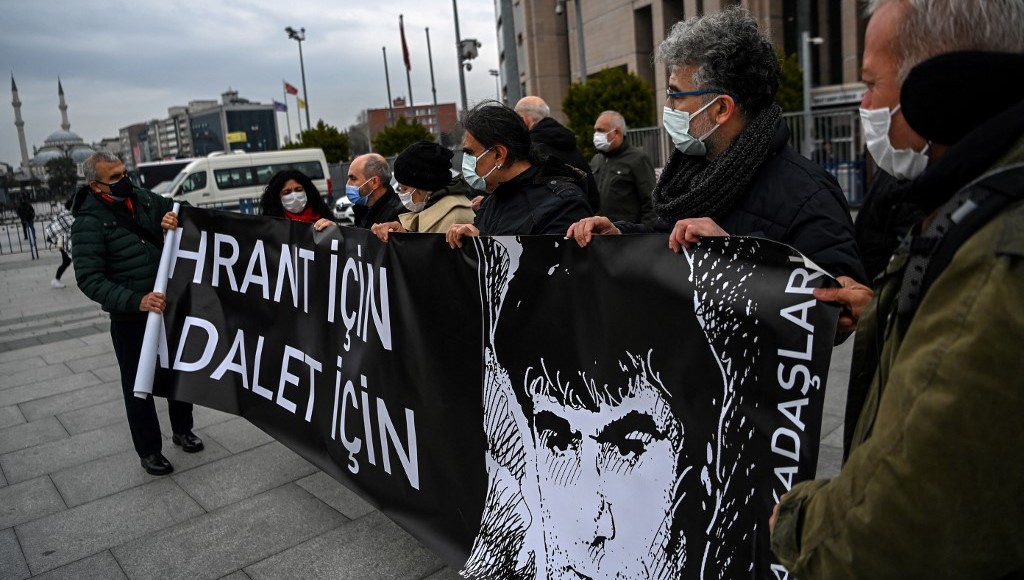Turkey’s Supreme Court of Appeals has upheld acquittals while overturning other verdicts of an İstanbul court that presided over the trial of 76 defendants – the majority of them public officials – accused of having had a role in the killing of Turkish-Armenian journalist Hrant Dink, the Diken news website reported on Wednesday.
The 52-year-old Dink, editor-in-chief of the Turkish-Armenian bilingual Agos weekly, was shot dead with two bullets to the head outside the newspaper’s headquarters in central İstanbul on Jan. 19, 2007 by a then-17-year-old jobless high school dropout.
The verdict handed down on March 26, 2021 by the İstanbul 14th High Criminal Court included 33 acquittals and 27 convictions.
Engin Dinç, former director of the Trabzon police intelligence unit; Reşat Altay, former Trabzon police chief; and Ahmet İlhan Güler, former director of the İstanbul intelligence unit, were acquitted of “negligent homicide.”
Ramazan Akyürek and Ali Fuat Yılmazer, two of the jailed defendants and former police chiefs, were given aggravated life sentences by the Turkish court for “premeditated murder,” while four defendants, including former gendarmerie members Muharrem Demirkale and Yavuz Karakaya, received life sentences.
Ogün Samast, who was an unemployed 17-year-old at the time, had confessed to the murder and was sentenced to almost 23 years in prison in 2011.
Ali Öz, a former interior ministry commander of the Black Sea region of Trabzon where the gunman came from, was sentenced to 28 years in prison on charges of “premeditated murder” and “forgery of official documents.”
The third chamber of the Supreme Court of Appeals on Wednesday upheld the acquittals of Dinç, Altay and Güler, among others. Additionally, they approved the conviction of Yılmazer and Akyürek for “premeditated murder” as well as the convictions of police officers Metin Balta and Yakup Kurtaran, and journalist Ercan Gün, for “membership in an armed terrorist organization.”
The chamber said Yılmazer, Akyürek, Demirkale and Öz, among others, were “jointly responsible as accomplices” in the premeditated murder of Dink, adding that Karakaya and fellow former gendarmerie member Bekir Yokuş were involved in the act as accomplices, according to Diken.
The court, while reminding that Öz was acquitted of several terrorism-related charges as well as the charge of “attempting to overthrow the constitutional order,” overturned the verdicts on Öz and several other defendants regarding the charge of “forgery of official documents.” This decision was made due to the necessity of the case being heard in a high criminal court. Consequently, the case was remanded to the 2nd Criminal Chamber of the İstanbul Regional Court of Justice for these defendants.
The court also overturned the convictions of former Trabzon gendarmerie intelligence officer Volkan Şahin, the former chief inspector of the Interior Ministry Şükrü Yıldız and Mehmet Ali Özkılınç on charges of “negligent homicide,” “assisting an armed terrorist organization” and “membership in an armed terrorist organization,” respectively, saying that the convictions were based on errors in the assessment and evaluation of evidence.
The court further ruled for the continued detention of defendants Karakaya, Muharrem Demirkale, Okan Şimşek, Veysal Şahin, Gazi Günay, Osman Gülbel and Hasan Durmuşoğlu.
The İstanbul 14th High Criminal Court in 2021 separated the files of 13 fugitive suspects, including Fethullah Gülen, on the grounds that their defense statements were not delivered, also ruling that Dink’s murder was committed “in line with the objectives of FETÖ” – a derogatory term used by the Turkish government to refer to the faith-based movement inspired by Gülen as a terrorist organization.
For years, prosecutors have looked into alleged links between the suspects and Gülen, who is accused of masterminding a failed coup against President Recep Tayyip Erdoğan in 2016, although he strongly denies the charges.
The Turkish government’s ongoing crackdown on the Gülen movement was launched following corruption investigations in late 2013 that implicated Erdoğan’s close circle and culminated in the aftermath of a failed coup on July 15, 2016.

